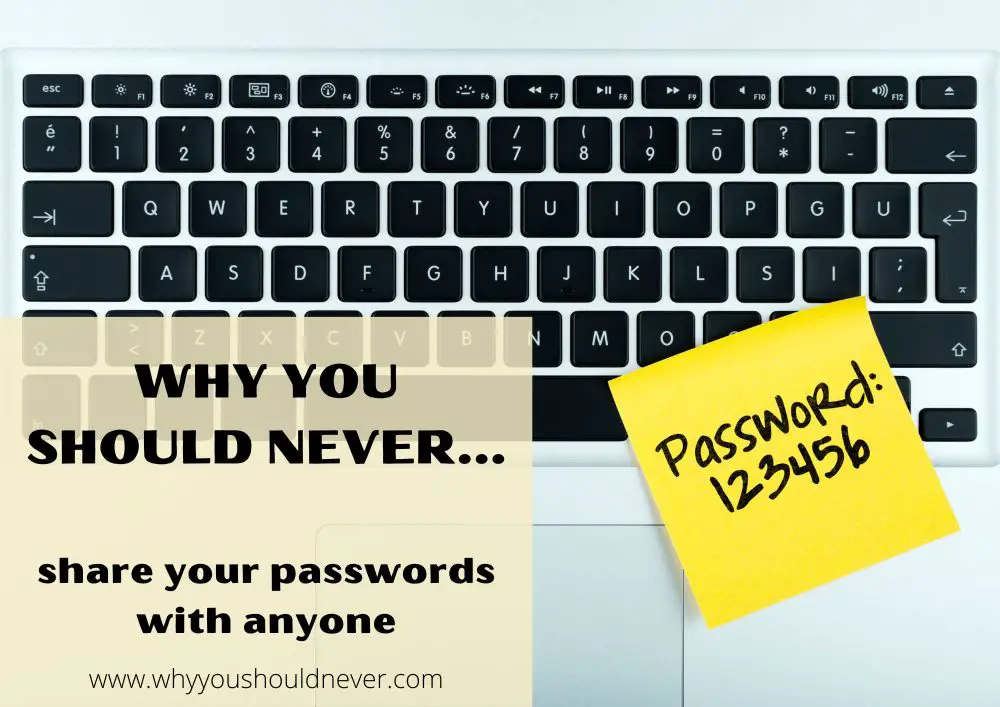![]()
Why You Should Never Share Your Passwords With Anyone
In today’s world, we all have multiple online accounts that require us to create a password. Whether it’s for our email, social media, online banking, or shopping websites, passwords have become an essential aspect of our digital lives.
Put simply, with access to the right passwords, someone can gain access to all sorts of personal and sensitive information.
Despite this, many people still choose to share their passwords with others. There are, of course, valid reasons why a person might do this – perhaps they want to allow a friend or family member access to their Netflix account, or they need someone to handle their online banking while they’re away.
And while this type of password-sharing might seem harmless on its surface, it’s important to remember that there are many risks involved with giving someone access to your personal information, no matter who it is. Let’s take a look at some of those risks below.
9 reasons why you shouldn’t share your password with anyone
1. Trust issues
The first and most obvious reason why you shouldn’t share your passwords is trust. Just because someone is a close friend or family member, it doesn’t necessarily mean that they can be trusted with your sensitive information.
Even if you trust someone, you never know when their computer might get hacked or stolen, and your password could fall into the wrong hands.
There’s also the possibility that you have a falling out with someone who has access to an important account. You never know what spiteful, malicious acts they might perform in the name of revenge.
2. Risk of identity theft
Identity theft is a real danger in today’s digital age. If someone has your password, they can easily impersonate you online and gain access to your personal and financial information. They could apply for credit cards, open bank accounts in your name, or even commit a crime using your identity.
3. Privacy invasion
Sharing particular passwords with someone could mean that you’re giving them access to all of your personal information. This could include your private messages, emails, and social media profiles. Even if you trust the person you’re sharing your password with, they could accidentally or deliberately invade your privacy by reading your messages or sharing your personal information with others.
4. Loss of control
When you share your password, you’re essentially giving someone else control over your account. They can make changes to your account settings, delete important emails or messages, or even change your password and lock you out of your own account. It’s important to remember that once you give someone else access to your account, you lose control over what happens to it.
5. Legal issues
Sharing your password could open you up to legal issues. For example, if you share your Netflix password with someone who is not authorized to use it, you could be violating the company’s terms of service. In some cases, this could result in legal action being taken against you.
Additionally, if the person you share your password with does something illegal using your account, you could be held legally responsible.
6. Unintended consequences
Password-sharing could have unintended consequences that you may not have considered. For example, if you share your email password with someone and they accidentally delete an important message, you could lose valuable information.
Or if you share your social media password with someone and they post something inappropriate, it could damage your reputation.
7. Potential for blackmail
There’s always the risk of blackmail when someone has access to your private accounts. They could use whatever they find against you in the future. For example, they could threaten to release embarrassing information or photos if you don’t do what they want.
8. They might see things they shouldn’t see
Look, we all have our secrets. Whether it’s embarrassing photos, personal messages, or other sensitive information, there are some things that we just don’t want others to see or know about us. By sharing your password, you’re essentially giving someone else access to all of those things.
Even if you think you have nothing to hide, who’s to say that the person you’re sharing your password with won’t stumble across something that they find embarrassing or incriminating?
You could end up damaging friendships or relationships if they see something they shouldn’t.
9. One password could lead to all accounts being compromised
Another important reason why you should never share your password with anyone is that one password can often lead to a domino effect, resulting in all of your accounts being compromised.
Many people use the same password for multiple accounts, either because they find it easier to remember or because they think it’s more secure.
However, if someone gains access to just one of your passwords, they could potentially gain access to all of your accounts.
They could try using the same password across multiple accounts and see what works. Or, they could use the information they find on one account to guess the password on another account.
Wrapping up
This might sound cynical, but no one can be trusted 100% when it comes to your personal and sensitive information. No matter how close you are to a person, or how well you know them, it’s always better to err on the side of caution and keep your passwords to yourself.
Remember, passwords are the keys to your digital kingdom and should be treated with the same care as you would with your physical keys.
If you have to share your password temporarily, make sure to change it as soon as possible afterwards. And if you’re having trouble managing multiple passwords, consider using a password manager to keep everything secure.
